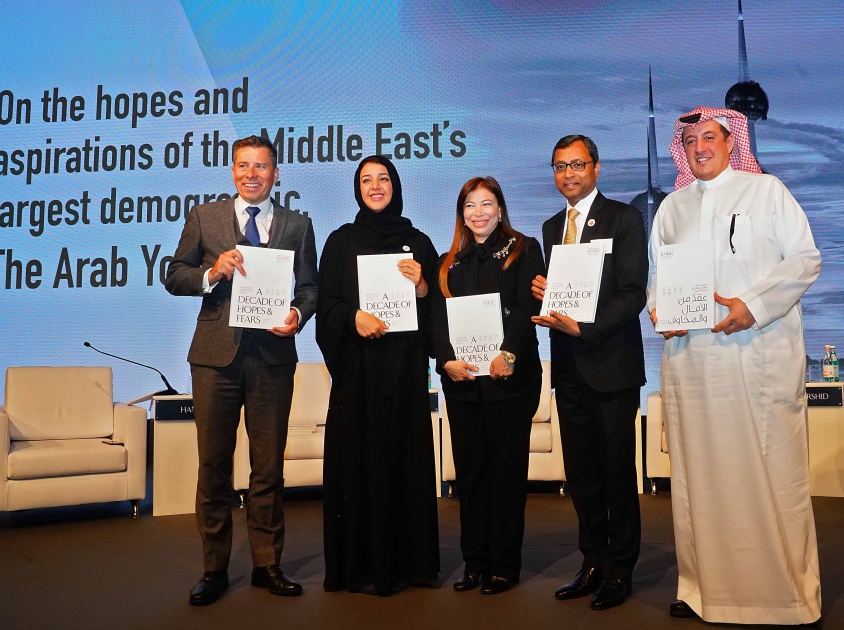
Young Arabs express great hopes for Saudi Crown Prince’s leadership and reforms in a region they see as having drifted off course
In a region they view as having drifted off course over the past decade, young Arabs say action on jobs, education, fighting terrorism and corruption is needed to steer the region in the right direction. Arab youth overwhelmingly support the reforms Saudi Arabia’s Crown Prince Mohammed Bin Salman is spearheading and view him as a strong leader who will shape the region over the next decade, according to the 10thannual ASDA’A Burson-Marsteller Arab Youth Survey 2018, released today.
The survey also reveals that the perception of global power in the region has shifted markedly, with a majority of Arab youth across the region now viewing the U.S. as an adversary and Russia, instead, seen as the top non-Arab ally among young people.
The ASDA’A Burson-Marsteller Arab Youth Survey is the largest survey of its kind of the Middle East’s largest demographic – its youth. For the 10thannual survey, international polling firm PSB Research conducted 3,500 face-to-face interviews with men and women aged 18-24 in 16 Arab nations and territories, between January 21 and February 20, 2018.
The majority of young Arabs (55 percent) say they believe the region has moved in the wrong direction over the past decade – a period stamped by the Arab Spring and the rise of Daesh. Pessimism is particularly pronounced in the Levant, where 85 percent say the region has moved in the wrong direction. Defeating terrorism, providing well-paying jobs, better education and fighting corruption are all cited by youth as the main action areas to move things back on track over the next decade.
Young Arabs are also throwing their support behind Saudi Arabia’s young Crown Prince, Mohammed Bin Salman, and view him as the Arab leader likely to have the greatest impact on the region over the next 10 years. Asked about the reforms introduced by the Crown Prince, 88 percent of young Arabs support Saudi Arabia’s decision to allow women to drive and 86 percent (94 percent among young Saudis) support his anti-corruption drive, which saw dozens of leading businessmen and senior royals detained over graft allegations.
“Over the past 10 years, the Arab Youth Survey has provided insights into many momentous changes in the region, and this year is no exception,” said Donna Imperato, CEO, Burson Cohn & Wolfe. “This annual review of the thoughts and concerns of Arab Youth provides an important framework for understanding what is most important to the region’s next generation of business leaders and policy makers.”
An overwhelming majority (78 percent) of Arab youth say Daesh has become weaker over the past year and, furthermore, 58 percent say Daesh and its ideology will be completely defeated. It marks a significant shift from 2015 when only 47 percent of young Arabs expressed any confidence in their government’s ability to deal with the terrorist organisation.
In another dramatic shift, young Arabs now view the U.S. as an adversary, while Russia has taken America’s spot as the top non-Arab ally. A majority (57 percent) of Arab youth say the U.S. is an adversary of their country (up from 32 percent in 2016) versus 35 percent who see America as an ally (down from 63 percent in 2016). When asked to name their country’s top allies, young Arabs are most likely to cite the UAE, Saudi Arabia and Kuwait, followed by Russia in fourth place and Egypt in fifth. The U.S. has dropped out of the top five for first time in the survey’s history, falling to 11thplace.
This finding stands in contrast to the response from young Arabs when asked which country other than their own they would most like to live in, and which they would like their own nation to emulate, where the U.S. ranks second, behind the UAE. Additionally, respondents’ most trusted media brand is CNN.
Sunil John, founder of ASDA’A Burson-Marsteller and President, Middle East, Burson Cohn & Wolfe, said: “This is a milestone survey for us, marking a full decade of the region’s leading study into its most important demographic.
“This year has produced some striking findings, including more evidence that the region’s youth view the U.S. in a very different light from previous years, and that the majority of young people now envision a future where Daesh and its ideology have no place whatsoever.”
For this year’s survey, international polling firm PSB Research conducted 3,500 face-to-face interviews with exclusively Arab national men and women in the six Gulf Cooperation Council (GCC) countries of the UAE, Saudi Arabia, Qatar, Kuwait, Oman and Bahrain; Iraq, Egypt, Jordan, Lebanon, Libya, the Palestinian territories, Tunisia, Morocco, Algeria and Yemen. The sample comprised 50 percent male and 50 percent female respondents.
Other key findings from the ASDA’A Burson-Marsteller Arab Youth Survey 2018:
- The UAE remains the top country Arab youth want to live in and want their own countries to emulate
- Youth in the Levant have an increasingly bleak outlook compared with peers in North Africa and the Gulf States
- While young Arabs increasingly turn to social media for their news, they see CNN as the most trusted and Al Jazeera as the least trusted news sources
- Inspired by the digital revolution, future Arab entrepreneurs turn to the tech sector, which offers plentiful opportunities in the region


























